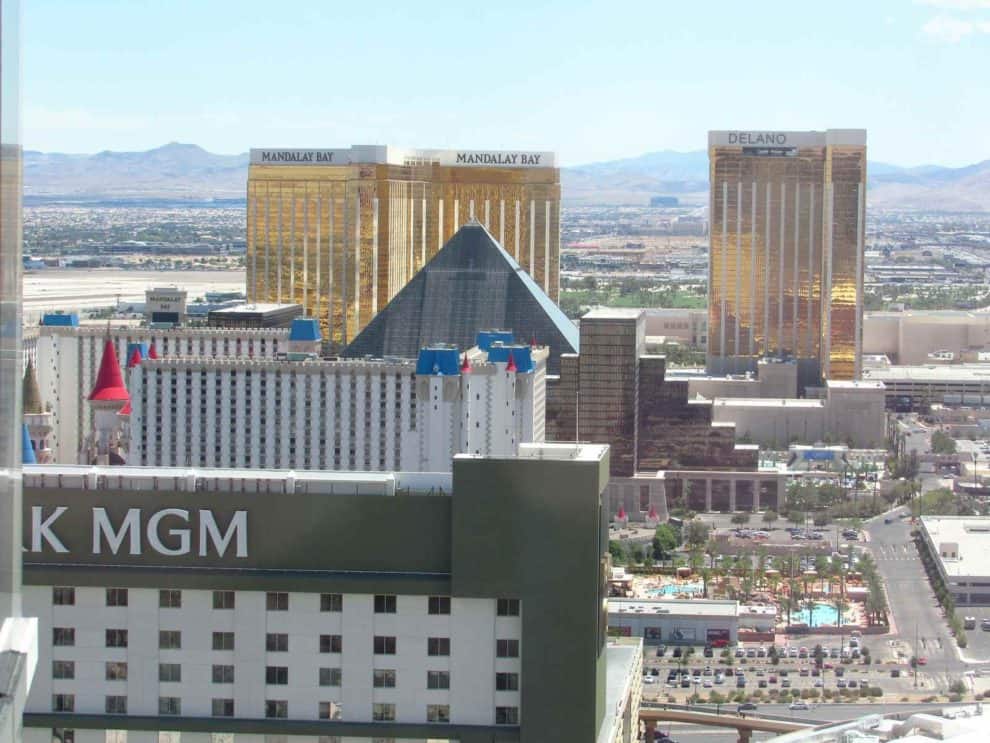
- The Mirage and Mandalay Bay will close their hotel towers on weekdays until the end of December.
- The move is due to continued weakness in midweek occupancy at Strip resorts.
- There is a growing concern that the current spate of COVID-19 cases could prompt another shutdown of the Nevada gaming industry.
As the Las Vegas tourism and gaming industry continues to struggle amid the newly resurgent COVID-19 pandemic the marquee names on The Strip are hurting the most. The current dynamic is a simple one–the greater a property’s exposure to fly-in guests relative to Las Vegas locals the more they’re suffering. Locals oriented properties are doing reasonably well at the moment but some of the most iconic brands in the industry aren’t as fortunate. The biggest problem is the dearth of international travel and the complete absence of convention business that has sent mid-week occupancy at Strip properties to unprecedented lows.
The latest evidence of the historically week midweek demand came today as MGM Resorts announced that the hotel towers at the Mandalay Bay and The Mirage will close Monday through Thursday starting on November 30. The properties will open at noon on Thursday and accommodate midweek guests through at least the end of December. This in addition to the midweek closure of the Park MGM property that was announced previously.
MGM Resorts kept the announcement low key–as of Friday afternoon there was nothing on either the consumer facing or investor relations section of the company’s official website. A statement was provided to the media by Brian Ahern, Director of Media Relations for MGM Resorts:
“We are constantly evaluating occupancy levels and adjusting operations accordingly. With occupancy remaining low during the weekdays, we have decided to temporarily close hotel tower operations at Mandalay Bay and The Mirage Monday – Thursday, effective Nov. 30. Casinos, restaurants, and other amenities remain open at properties throughout the week.”
“While we do not currently expect the mid-week hotel closures to remain past December, we will continue evaluating business levels to determine how long they are in effect.”
Balancing the need to keep costs down with the need to stay open for business has been a tough one for gaming properties to maintain. Earlier this month, Anton Nikodemus, President and COO MGM Resorts Las Vegas Portfolio, had this comment in announcing the midweek closure of the Park MGM:
“As many of you know, the November and December holiday season is traditionally a slow period for Las Vegas in terms of visitation and business levels. This year has proven to be especially challenging due to the ongoing impact of COVID-19 and the absence of the major meetings, conventions and events that typically fill Las Vegas’ calendars during the fall and winter months.”
MGM Resorts stock (NYSE:MGM) was down -1.03 points or 3.78% on Friday, part of a broader market decline that saw the DJIA lose more than 200 points on concern over rising COVID-19 cases. Throughout the Nevada gaming industry, there is growing concern that the resurgence of the coronavirus pandemic could cause much bigger problems than declining stock prices.
For now, Nevada has avoided a wholesale closure of the state’s gaming industry such as has been implemented elsewhere including most recently in Illinois and Ohio. Whether one is under consideration is unclear. Governor Steve Sisolak announced earlier this week that more restrictions intended to mitigate the spread of COVID-19 were ‘coming soon’. Due to the number of gaming companies headquartered in Nevada with exposure to other US states and foreign countries, new restrictions elsewhere already hit the Silver State economy.
Even among veteran gaming industry observers there is disagreement as to what path Sisolak should take. Obviously, the economy of Nevada is inextricably interwoven with gaming more than any other state in the country. A secondary problem is that Nevada is also extremely dependent on other industries that require ‘face to face’ contact such as dining, entertainment, hospitality, etc. The other side of the argument–with Las Vegas already heading into one of the slowest months of the year independent of COVID-19 and most gaming companies already taking steps to cut costs this might be the ideal time for a full or partial closure to help stem the spread of the coronavirus.









